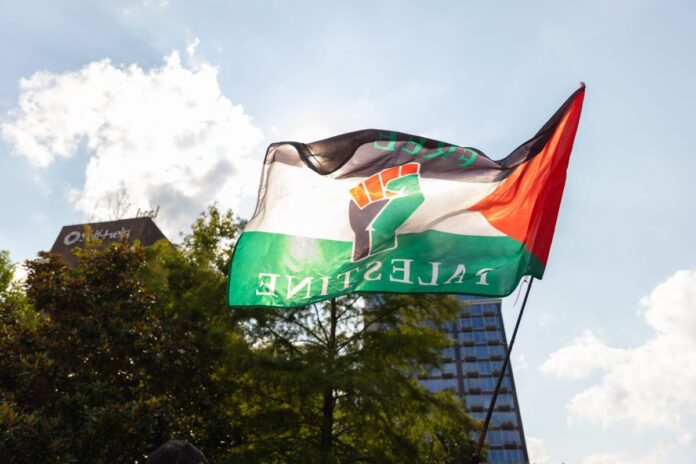Featured photo: A pro-Palestine supporter holds a Palestinian flag in downtown Greensboro on Aug. 10. (photo by Brandon Demery)
A Palestinian woman uses her body as a shield, protecting her two young children from bullets that ricochet off the walls of their home. Shortly afterward, she greets Jane Carter with a tray of cold drinks and frantically apologizes for her lack of hospitality.
Then, she gets in Jane’s face and unloads her grievances.
“On every bullet, it says made in USA,” the mother exclaims.
The Israeli incursion that targeted the Palestinian mother occurred in 2001, but Quaker American educators Max and Jane Carter have been leading service learning trips to Ramallah since before I was born, 27 years ago.
In the temperate Fellowship Hall of the New Garden Friends Meeting on Aug. 1, I listen to how grossly different life is for an Indigenous Palestinian and an Israeli settler on the same land.
Sometimes I wince or grunt; I swallow often to keep myself from choking on my rage.
***
In a conversation captured by the 1967 Peter Brooks documentary Tell Me Lies exploring the Vietnam War, Black revolutionary Kwame Ture — formerly known as Stokely Carmichael — claims there’s a difference between peace and liberation.
“You can have injustice and have peace, isn’t that correct? You can have peace and be enslaved. So, peace isn’t the answer. Liberation is the answer.”
I didn’t expect my favorite of Ture’s nuanced arguments to frame the antagonistic situation in the West Bank so seamlessly, but it does.
The depth of inequality between the settlers and the Palestinians is horrifically upsetting. Sixty percent of the divided West Bank is under complete Israeli control.
Palestinians in this area often face water shortages and have to retrieve water from subpar tanks installed on their roofs, while settlers have access to water 24/7 in their houses. The settlements are connected by their own, superior road systems while Palestinians are required to navigate heavily monitored, overly-complicated road systems. Israelis operate under Israeli civil law while Palestinians are judged and punished harshly by Israeli authorities under military law.
Though the Carters don’t explicitly define settler-colonialism, there’s no doubt in my mind that the conditions they’re describing are the result of U.S. imperialism and ethnic apartheid.
“Most Palestinians don’t meet an Israeli unless it’s at a checkpoint or there’s an invading army patrol or a settler coming in,” Max explains. “The only Palestinians Israelis ever meet, if they meet any, is if they’re in the army and they’re assigned to the West Bank.”
He goes on to explain that the army is there to protect the settlers even if they’re performing illegal and violent acts against Palestinians, which happens a lot.
My thoughts immediately jump to South Africa, where the term apartheid was first used to describe the system of institutionalized racial segregation and discrimination by the National Party from 1948 until the early 1990s. Although multiple groups in society were morally opposed to these laws, the government was able to suppress resistance at times, creating periods of apparent stability. But this peace was deceptive; it came at the cost of widespread systemic oppression.
The same could be said about life under Jim Crow in the American South, where segregationist policies were used to control and mitigate tensions between different classes and races.
In a 1905 article in The Athens Banner, a white writer argues that Northern journalists misinterpret the oppression of the “Negro.”
“It is always the same idea that prompts the separation of the races,” the writer claims. “It is to preserve the civilization of both races and to ensure peace and good order.”
When Ture says that peace is the white man’s word, he’s equating peace with maintaining the oppressive status quo. You can’t have true peace until everybody’s free and equal.
***
It’s time for the Q&A portion of the night. Someone I can’t see in the back row asks Max to give his honest opinion on a two-state solution.
“Put a fork in it,” Max tosses out. “It’s done.”
The glibness of this phrase is undercut by his tone and a new intensity in his eyes; he’s serious.
“There is no possibility of a two-state solution when all the territories have been gobbled up. How do you create a state when you have no control of your borders, no control of your resources, and you’re totally under occupation?” he asks.
A Palestinian woman and mother named Annah Awartan raises her hand but doesn’t have a question. She speaks about leaving Palestine when she was 18 and reminds us that “all the bombs” used there are made in America. She informs us that, although her three children were born in America and have American passports, they’ve been tortured at various points in their lives, presumably by the Israeli army, though she doesn’t explicitly name the perpetrators.
“They are unbelievable people. They steal the land from the Palestinians — they stole our land. They demolish everything in the land.”
She wasn’t allowed to visit Jerusalem until 2020. “Israel didn’t want peace,” she explains earnestly.
Under the greedy logic of imperialism, the conversation about peace is no longer relevant.
Segregation, land theft, and genocide are inexcusable; what the Palestinian people deserve is liberation.
I leave the fellowship hall thinking about something important Max said: Many of the Palestinians he’s talked to don’t even utter the word peace in the context of the occupation anymore — they’re ready for justice.
Join the First Amendment Society, a membership that goes directly to funding TCB‘s newsroom.
We believe that reporting can save the world.
The TCB First Amendment Society recognizes the vital role of a free, unfettered press with a bundling of local experiences designed to build community, and unique engagements with our newsroom that will help you understand, and shape, local journalism’s critical role in uplifting the people in our cities.
All revenue goes directly into the newsroom as reporters’ salaries and freelance commissions.
